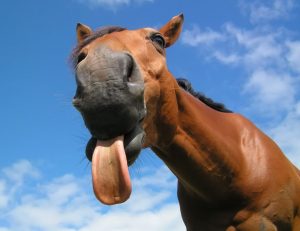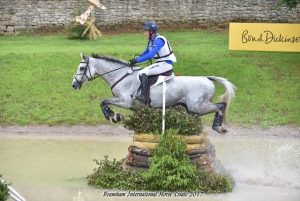They say that you should tell a gelding, ask a mare and discuss it with a stallion, writes Carolyn Henderson. But as anyone who’s benefited from the horse equivalent of girlpower will appreciate, a good mare will give you everything she’s got.
Why are so many riders prejudiced against them? If a stallion makes his opinion clear, it’s accepted far more readily than if a mare tests a

rider’s ability, yet both are ‘entires’ who demand equal tact.
Of course, geldings should also be treated with tact. But how many times have you heard the words ‘stroppy mare’ being used as an insult? And though it’s a reverse compliment, how many riders almost apologise for their lovely horses by insisting that they’re ‘not at all marish’?
The fight against prejudice goes back a long way. In 1837, Charles James Apperley, aka the author Nimrod, commented that the prejudice against mares as suitable hunters was “much to be lamented” and meant they were more likely to fall into the hands of those such as farmers, who would not be able to make the most of their ability. Apologies to any farmers…
Horses are individuals and there are probably as many geldings with oversized personalities as there are challenging mares. However, riders with a special affinity for mares say that whilst a good gelding will often work for you, a good mare will work with you.
There are many more successful geldings than mares competing, but it would be interesting to know how much of that is due to rider prejudice. Here’s a thought – if event rider Lucinda Fredericks hadn’t taken on the double whammy of a little chestnut mare called Headley Britannia, would she have won all three Rolex Grand Slam events? Lucinda is super-talented on any horse, but on Brit, she was unbeatable.
There might be times when mares are ruled by their hormones, but owners should be able to cope with this via good management and nutritional support, a sensitive approach and, if necessary, veterinary advice. Don’t just take my word for it: listen to the realistic assessment of event rider Will Furlong, who is sponsored by Feedmark.

“Mares are great when they are on side, not so good when they aren't,” says Will. “The brain and temperament are the most important thing for me in a mare. When you find one like that, she will try harder and dig deeper than any gelding will.
“You have to treat each individual horse differently. What works for one horse might not work for another. In general, you have to be a bit more sympathetic with mares, but I think there is a traditional and unfair image of all mares being horrible to deal with and difficult to ride."
So, let’s hear it for the girls. And if you’ve got a great mare, we’d love to hear about her.
“It's worth spending more time on the ground with them to develop some more trust, something I do with all my horses. I don't necessarily go out looking for mares but I think that in general, people should be more accepting of them.”
 rider’s ability, yet both are ‘entires’ who demand equal tact.
Of course, geldings should also be treated with tact. But how many times have you heard the words ‘stroppy mare’ being used as an insult? And though it’s a reverse compliment, how many riders almost apologise for their lovely horses by insisting that they’re ‘not at all marish’?
The fight against prejudice goes back a long way. In 1837, Charles James Apperley, aka the author Nimrod, commented that the prejudice against mares as suitable hunters was “much to be lamented” and meant they were more likely to fall into the hands of those such as farmers, who would not be able to make the most of their ability. Apologies to any farmers…
Horses are individuals and there are probably as many geldings with oversized personalities as there are challenging mares. However, riders with a special affinity for mares say that whilst a good gelding will often work for you, a good mare will work with you.
There are many more successful geldings than mares competing, but it would be interesting to know how much of that is due to rider prejudice. Here’s a thought – if event rider Lucinda Fredericks hadn’t taken on the double whammy of a little chestnut mare called Headley Britannia, would she have won all three Rolex Grand Slam events? Lucinda is super-talented on any horse, but on Brit, she was unbeatable.
There might be times when mares are ruled by their hormones, but owners should be able to cope with this via good management and nutritional support, a sensitive approach and, if necessary, veterinary advice. Don’t just take my word for it: listen to the realistic assessment of event rider Will Furlong, who is sponsored by Feedmark.
rider’s ability, yet both are ‘entires’ who demand equal tact.
Of course, geldings should also be treated with tact. But how many times have you heard the words ‘stroppy mare’ being used as an insult? And though it’s a reverse compliment, how many riders almost apologise for their lovely horses by insisting that they’re ‘not at all marish’?
The fight against prejudice goes back a long way. In 1837, Charles James Apperley, aka the author Nimrod, commented that the prejudice against mares as suitable hunters was “much to be lamented” and meant they were more likely to fall into the hands of those such as farmers, who would not be able to make the most of their ability. Apologies to any farmers…
Horses are individuals and there are probably as many geldings with oversized personalities as there are challenging mares. However, riders with a special affinity for mares say that whilst a good gelding will often work for you, a good mare will work with you.
There are many more successful geldings than mares competing, but it would be interesting to know how much of that is due to rider prejudice. Here’s a thought – if event rider Lucinda Fredericks hadn’t taken on the double whammy of a little chestnut mare called Headley Britannia, would she have won all three Rolex Grand Slam events? Lucinda is super-talented on any horse, but on Brit, she was unbeatable.
There might be times when mares are ruled by their hormones, but owners should be able to cope with this via good management and nutritional support, a sensitive approach and, if necessary, veterinary advice. Don’t just take my word for it: listen to the realistic assessment of event rider Will Furlong, who is sponsored by Feedmark. “Mares are great when they are on side, not so good when they aren't,” says Will. “The brain and temperament are the most important thing for me in a mare. When you find one like that, she will try harder and dig deeper than any gelding will.
“You have to treat each individual horse differently. What works for one horse might not work for another. In general, you have to be a bit more sympathetic with mares, but I think there is a traditional and unfair image of all mares being horrible to deal with and difficult to ride."
So, let’s hear it for the girls. And if you’ve got a great mare, we’d love to hear about her.
“It's worth spending more time on the ground with them to develop some more trust, something I do with all my horses. I don't necessarily go out looking for mares but I think that in general, people should be more accepting of them.”
“Mares are great when they are on side, not so good when they aren't,” says Will. “The brain and temperament are the most important thing for me in a mare. When you find one like that, she will try harder and dig deeper than any gelding will.
“You have to treat each individual horse differently. What works for one horse might not work for another. In general, you have to be a bit more sympathetic with mares, but I think there is a traditional and unfair image of all mares being horrible to deal with and difficult to ride."
So, let’s hear it for the girls. And if you’ve got a great mare, we’d love to hear about her.
“It's worth spending more time on the ground with them to develop some more trust, something I do with all my horses. I don't necessarily go out looking for mares but I think that in general, people should be more accepting of them.”











